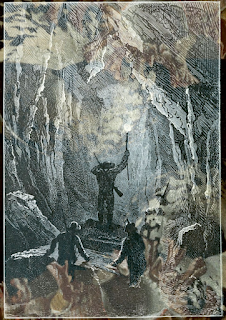 |
| Into the Iron Coral |
I backed Into The Odd remastered, by Chris McDowall, on Kickstarter. The rules barely differ from the original version of Into The Odd, but there is more advice for referees on the game, and a large section on The Odd World, including a substantial dungeon adventure, The Iron Coral; a hexcrawl, The Fallen Marsh; and details of a small fishing town, Hopesend - Last Port of the North. There's also stunning new design and layout by designer Johan Nohr (whose work you may know from Mörk Borg - his design for Into The Odd is very different, but equally radical).
I've been wanting to play Into The Odd (and its big sibling, Electric Bastionland) for some time. The rules are incredibly simple and incredibly well thought through. There are several several podcasts with the game's designer Chris McDowall which I recommend tracking down for the insight it gives into his approach to games design, and the ruthlessness and clarity with which he whittles down rules. I would argue that McDowall (along perhaps with Monte Cook and his Cypher system) is the best games designer our there. His rules are about as simple as the could possibly be - he has said that his intention was to produce a game that his parents could pick up and play immediately - but they also encourage good and engaging gameplay (the referees tips in the revised version of Into The Odd reinforce this - as does the lengthier tips section in Electric Bastionland, and these tips on Chris's blog).
Probably the most radical rule is that combat has no "to hit" roll. You just roll damage on your opponent, every round. This can seem heresy to players of D&D-alike games, but it's really no less artificial, and it makes combat a lot quicker and simpler; the fact that players know combat will always be damaging also makes them approach it a little more cautiously. I remember during one session of the Three Mile Tree D&D campaign I play in, we had a fairly typical combat which involved a long to-and-fro of "You miss. They miss. You miss. They miss. You miss. They miss", after which our DM David McGrogan exclaimed "that would have gone a lot quicker if we'd been playing Into The Odd". And it would. The combat system eliminates some of the cruft that can make combat in other games tedious rather than nail-biting.
Into The Odd does not include Electric Bastionland's "gang rule" whereby, no matter how many opponents or weapons hit a target, only the highest-rolling does any damage. Another heresy, but playing without it in many-on-one conflicts made things pretty unbalanced (especially as, with no initiative rules, the players always attack first unless surprised). Next time I play, I will be using the gang rule.
So anyway, our players (one newbie adult; one adult and one teen who both play D&D fairly regularly) loved the game. I found the location descriptions, which are just a few, evocative words and short sentences, very conducive to building my own descriptions while not getting to flustered reading text. We got through perhaps a quarter of the dungeon, which included a couple of trips back to town to replenish and recover (no spoilers but the "Echoes of the Iron Coral" rule made this extra interesting). And they can't wait to play again (which will take a while, as it means getting Anwen & Willow back up from Sheffield to stay with us again; on the plus side, they're keener than ever to do so!)
I recently listened to an episode of the Wobblies & Wizards podcast featuring Yochai Gal. Yochai (who also credits Chris McDowall as being the best games designer) has written a game, Cairn, based on the Into The Odd rules. Cairn is a more traditional fantasy setting, as well as adding an element of character specialisation with classes. After downloading Cairn a while ago, I finally got around to reading it and it's great. I can't wait to try it.
No comments:
Post a Comment